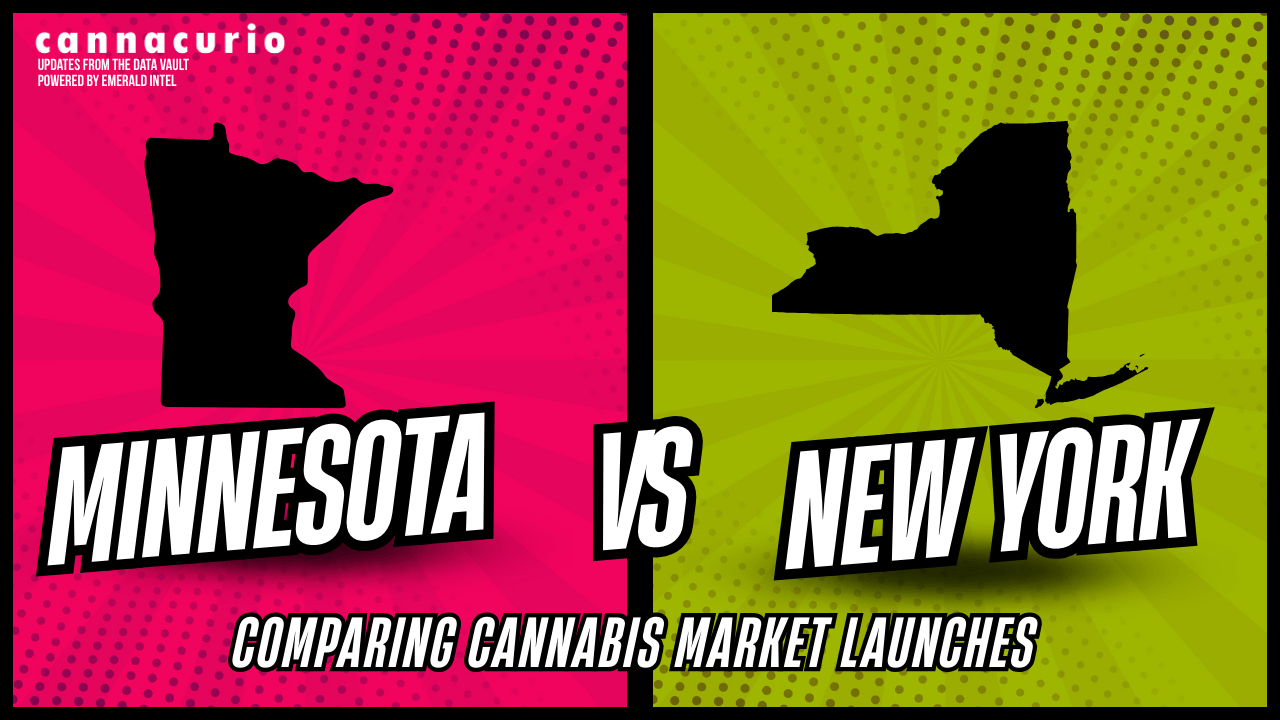
Franchising in the Cannabis Industry
Franchising in the cannabis industry has been gaining widespread interest over the past few years, and truth be told, this is not a surprising trend. When Franchise Times chose ONE Cannabis as the first cannabis franchisor included in its annual Dealmakers Award back in 2019, licensed cannabis business franchising gained significant credibility and attention.
Fast-forward to 2021, and Cannabiz Media is tracking a growing number of licensed cannabis franchise businesses in the Cannabiz Intelligence™ business intelligence base. As shown in the chart below, three franchisors dominate the cannabis industry franchise landscape across the U.S. and Canada. The current franchise leaderboard includes:
- Inner Spirit Holdings, Ltd.: 39 stores
- Dutch Love Cannabis: 27 stores
- Cookies: 26
- Uncle Sam’s Cannabis Ltd.: 8
- From the Earth Inc.: 6
- The Peak Dispensary: 6
- ELEV8 CANNABIS LLC: 4
- Eufloria LLC: 3
- Feel State: 2
- Curio Wellness: 1
- Moodz Cannabis: 1
- Unity Rd.: 1

Bottom-line, franchising makes sense in the cannabis industry, particularly for dispensaries and retailers where the franchise business model has been proven to work across diverse industries since U.S. franchise laws were first created in the 1970s.
However, franchising in the cannabis industry is different from franchising in any other industry because cannabis is still illegal at the federal level. A cannabis franchisor and/or franchisee could technically be in trouble or shut down at any time based on current federal cannabis and franchise laws.
Federal franchise sales laws are administered and regulated by the Federal Trade Commission (FTC), and it’s a felony to sell a franchise without complying with franchise sales laws. It’s important to note that ignorance is not a viable defense (i.e., accidental franchising is still a felony).
While registration with the FTC is not required, the laws still apply for all businesses that meet the criteria to be defined as franchises. The criteria are:
- The business (franchisor) has a trademark, name, or other commercial symbol that the recipient (franchisee) will use.
- The business provides significant assistance to the recipient in their method of operation. This could include a “marketing plan,” “community of interest,” or “significant assistance or substantial control.”
- The business charges a fee for their services to the recipient.
The franchise definition is often compared to a three-legged stool. All three pieces have to be present or the business is not a franchise – no matter how obviously the other two pieces are present. Item #2 is where businesses have a lot of wiggle room, but that leg of the stool varies by jurisdiction.
In other words, things change significantly at the state level. Just like each state’s cannabis laws are different, so are their franchising laws. The key here is that state franchising laws preempt federal franchising laws. Furthermore, different states have different franchise registration and filing requirements.
In fact, it’s these state-by-state differences that make some states more attractive for franchising than others. Currently, 26 states do not have franchise registration or filing requirements, which makes them much better options for franchising in an industry that is already steeped in regulations.
For example, Curio Wellness announced in August 2021 that it planned to franchise its retail business under a new name, Far & Dotter, in multiple states. Of the states the company plans to offer franchises, five don’t require registration at all (Massachusetts, Missouri, New Jersey, Ohio, and Pennsylvania), four require franchise registration (Illinois, Maryland, Michigan, and Virginia), and just one requires that the franchise be formally filed before they can sell to franchisees (Florida).
Taking a look at data in Cannabiz Media’s Cannabiz Intelligence, cannabis franchises with active and pending licenses are spread across the U.S. and Canada with most currently located in Ontario and Alberta in Canada followed by California and Oklahoma in the United States. Here’s the leaderboard breakdown by state or province:
- Ontario: 35
- Alberta: 23
- California: 17
- Oklahoma: 13
- British Columbia: 11
- Missouri: 5
- Massachusetts: 4
- Newfoundland and Labrador: 4
- Oregon: 4
- Michigan: 3
- Colorado: 2
- Manitoba: 1
- Maryland: 1
- Washington: 1

Why Franchising is Growing in the Cannabis Industry
Franchising offers pros and cons for both franchisors and franchisees. For franchisors, it’s a solution to accessing the capital and labor needed to expand. In other words, the franchisor can expand its footprint and build its brand with money from franchisors without incurring debt.
In the cannabis industry, franchising allows a business to expand at a crucial time – before federal legalization. A franchisor could establish a strong brand presence as the preferred brand among wide audiences of consumers before the market opens through full legalization across the entire country.
For franchisees, one of the biggest draws to franchising in any industry is the opportunity to own a business without feeling alone. Franchisees should get support, training, systems, and more from franchisors so they don’t have to figure everything out themselves. They can run their own businesses within certain franchisor parameters, pay the franchisor a fee to use the provided systems, trademark, etc., and keep the remaining profits. For many entrepreneurs who are comfortable following a system, franchising takes some of the risk out of starting and running a business.
Since the cannabis industry is filled with small, mom and pop shops, franchising provides an easy way for business owners who’ve been struggling to succeed on their own to join a proven company with systems for success already in place. In addition, people who want to get into the cannabis industry have an opportunity to work with a known brand and get the support they need from the very beginning when they choose to become a franchisee.
The Future of Franchising in the Cannabis Industry
Once cannabis is legal at the federal level, it’s highly likely that franchising will become even more popular in the cannabis industry. According to the data in Cannabiz Media’s Cannabiz Intelligence, there are twice as many cannabis franchises in Canada, where adult-use cannabis is legal, as there are in the United States.
The challenge for U.S. cannabis business franchisors in the future will be balancing federal and state laws. In both the cannabis industry and franchising, state laws preempt federal laws, so we can assume that even after cannabis legalization at the federal level, franchisors will still need to follow a patchwork of regulations to expand their brand footprints across the country.
In addition, it remains to be seen if cannabis franchisees will be profitable. Franchise royalty fees and franchise marketing fees can be very expensive, and when added to other fees and taxes that cannabis businesses have to pay, it may be difficult for a franchisee to generate a profit.
For perspective, Mike Weinberger, chief franchise officer of Item 9 Labs (which acquired ONE Cannabis Group and its Unity Rd. franchise model in March 2021), told Marijuana Business Daily, “Unity Rd. franchisees must have liquid capital of $1 million. The one-time franchise fee is $100,000, and Unity Rd. charges a 5% royalty fee and a 2% marketing fee based on gross sales, paid monthly.”
In exchange, Weinberger says, “We help them through licensing, we take care of their branding, their construction, their real estate, all their education, ongoing support, point-of-sale system selection, supply chain – we do everything so they can work on their business instead of in it.” The company expects to have 300 Unity Rd. franchise stores open in the next three years.
Running a cannabis business is expensive. Franchising a cannabis business is even more expensive. It will be up to franchisors to offer the training, systems, and support needed to ensure franchisees can viably compete and generate profits in the markets where they do business.
As in all industries where the franchise business model has been introduced, those are the only franchisors that will survive.
You can keep track of cannabis license holders, key contacts, and more in the Cannabiz Media License Database. For comprehensive financial analysis data, M&A targeting, and valuations subscribe to Cannabiz Intelligence™ – the business intelligence base for the cannabis and hemp industries. Schedule a demo to see it in action.
Need more insights?


.png)
